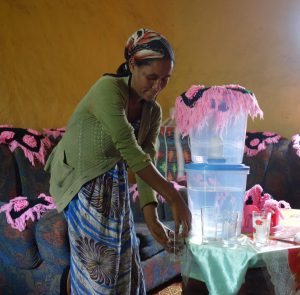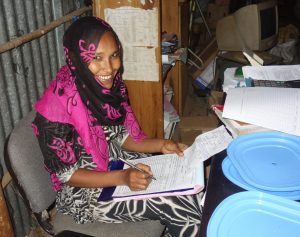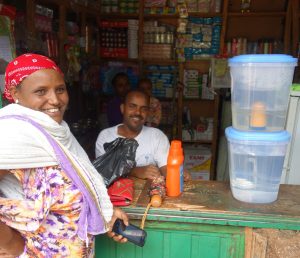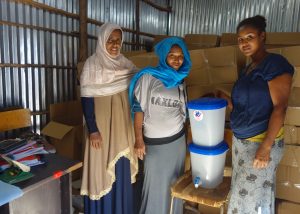Access to safe drinking water remains one of the most pressing challenges of our time. In Ethiopia, it is far from guaranteed. The country’s funding gap to meet Sustainable Development Goal 6 (SDG 6) in Ethiopia stands at USD 2.9 billion, a huge barrier to providing safe access. More than 44% of people lack access to protected water sources, and even when water is available, contamination during storage or from ageing pipes puts families at risk. For many households, this means unsafe water on the table, every single day.
Since 2017, a pioneering initiative in the Amhara region has shown that innovative approaches can change this reality — and scale to reach millions more.
Why water quality matters
The challenge is not just about getting water; it’s access to safe water.
- In urban areas, leaks in old infrastructure let contaminants in.
- Urban households do not have access to a 24/7 water supply and often rely on tanker water. The chlorine residual added during treatment, however, does not stay effective for more than 24 hours.
- In rural areas, chlorine treatment is irregular and often inconsistent.
- Even after collection, water stored in jerry cans or clay pots is re-contaminated in more than 80% of households.
Despite progress in water access, children and adults alike are still vulnerable to waterborne diseases. Unsafe water affects more than health. It hinders education, economic opportunities, and overall wellbeing.

Transforming access in Amhara
The Amhara region is home to over 30 million people, roughly the population of a small country. In 2017, Aqua for All introduced point-of-use water filter for homes.
Rather than focusing only on large infrastructure, the programme promoted the use of simple, effective household water filters that remove contaminants right where families use water, ensuring safety even if the source is unreliable.
The model relies on partnerships between suppliers, service providers —particularly last mile distributors, such as urban water utilities and agricultural cooperatives and grassroots mobilisers.
Initially piloted with water utilities, it quickly expanded to reach four zones and Bahirdar Town Administration, covering 80 utilities. To ensure long-term growth and sustainability, responsibilities were transferred to local institutions: the Amhara Towns Water Utilities Association (ATWUA) and agricultural cooperative unions now lead distribution.

Why utilities?
Ethiopia has over 18,000 water utilities, mandated to supply safe water. Their advantages include:
- Reaching both urban and peri-urban communities.
- Generating revenue beyond traditional water sales.
- Creating jobs and building trust with customers.
- Operating sustainably within market-based frameworks.
While utilities face capacity challenges and often prioritise access over quality, their widespread presence, technical expertise and mandate make them critical partners in safe water delivery.
Why cooperatives?
More than 80% of Ethiopians live in rural areas, making agricultural cooperatives essential partners. Nearly 100,000 cooperatives serve 24 million members nationwide. In the Amhara region alone, 23,000 cooperatives and 74 unions operate in agriculture, dairy, finance, irrigation and consumer services.
Cooperatives are deeply trusted by their communities and already distribute inputs like fertilisers and seeds. Their strengths include:
- Familiar instalment payment systems.
- Village-level shops accessible to remote communities.
- Member-elected governance, ensuring accountability.
- A mandate to improve members’ wellbeing, making safe water a natural fit.
- Any revenue generated by cooperatives is shared among members as dividends, including income from water filter distribution as a business venture.
By integrating water filters into their distribution networks, cooperatives deliver both economic and health benefits to millions.
The results so far
By December 2024, progress has been remarkable:
- Over 330,000 people in Amhara now drink safe water.
- Utilities have sold more than 41,820 filters, reaching 209,130 people.
- Cooperatives have distributed 24,500 filters, benefiting 122,500 people.
- Momentum continues, with 9,000+ filters distributed in just a few months after Aqua for All’s support ended, reaching more than 45,000 people.
Water filters are now treated like standard commodities — affordable and accessible to rural families through cooperative distribution and instalment payments. Competition between cooperatives has accelerated uptake, while utilities have strengthened relationships with customers by prioritising quality as well as access.
Linking safe water to climate action
Many families boil water using wood fires; using water filters eliminate this need, reducing carbon emissions. This opens opportunities in carbon credit markets, creating a sustainable revenue stream to expand the initiative.
The institutions use the mWater digital platform to track distribution and use, providing transparency that attracts investors, donors and climate finance institutions.

Scaling up to reach millions
In the next five years, the aim is to distribute 1,082,405 filters through cooperatives, reaching over 5.4 million people. Utilities plan to add another 500,000 filters, serving 2.5 million residents in towns and peri-urban areas. Together, these efforts will provide safe water to nearly 8 million people.
And there’s more. Plans are also underway to establish a water filter production plant in Amhara. It will create jobs, reduce costs and expand supply not only in Ethiopia but also in neighbouring countries including Sudan, Djibouti, and Somalia.
A blueprint for the future
The Ethiopian water filter programme proves that local institutions, innovative financing and community-driven approaches can deliver safe water at scale. It is a story of health, community empowerment, resilience and transformation.
By reducing disease, cutting carbon emissions, creating jobs and building trust, this initiative offers a blueprint for expanding safe water access across Africa and beyond.

Driving lasting change
By embedding safe water within institutions people already trust, the programme has created a sustainable, scalable and market-based model.
Its impact goes beyond health:
- Job creation in manufacturing, marketing, and last-mile delivery.
- Local ownership ensures solutions last beyond donor funding.
- Climate mitigation through reduced wood burning and carbon emissions.
- Policy influence, with Ethiopia’s new WASH financing strategy citing this project as a showcase model.
With Ethiopia’s population set to double by 2060, scalable solutions like this are essential. For families in Amhara, the difference is already clear: cleaner water, fewer illnesses and brighter futures.
What began as a pilot is now a proven model: safe water delivered through market-based systems, empowered local institutions, improved health and environmental protection.